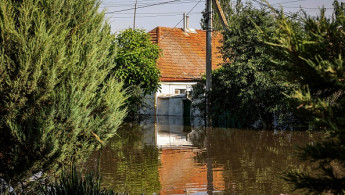Ukraine: Hundreds of thousands at risk from Kakhovka dam crisis, UN says
The UN warned Tuesday that the destruction of the Kakhovka dam in Ukraine could spark an environmental disaster and have dire humanitarian consequences for hundreds of thousands of people.
An attack on the major Russian-held dam in southern Ukraine unleashed a torrent of water that flooded a small city, inundated two dozen villages and sparked the evacuation of 17,000 people.
But the United Nations cautioned that the environmental and humanitarian consequences of the attack, for which Moscow and Kyiv traded blame, were likely to be much more far-reaching.
"We are gravely concerned about the destruction of the Kakhovka Dam, and the severe humanitarian impact on hundreds of thousands of people on both sides of the front line," the UN humanitarian agency OCHA said.
Pointing to reports from Ukrainian authorities that nearly 40 towns and villages were fully or partially flooded, the agency highlighted that "thousands have lost their homes overnight", while thousands more have lost access to water, food and basic services.
"The impact is also expected to be severe in the Russian-controlled areas," it warned.
Crimea, which reportedly receives water from the Kakhovka reservoir, would also be impacted.
While the scope and impact of the destruction of the dam and the depletion of the Kakhovka Reservoir were still being assessed, OCHA warned they were "projected to have severe and longer-term consequences on the humanitarian situation in the area".
Among other things, it cautioned, "flooding and fast-moving water can move mines and explosive ordnance to new areas which previously had been assessed as safe, thus putting more people in danger".
OCHA said emergency humanitarian response efforts were underway to provide urgent assistance to more than 16,000 people, including water supplies.
The UN's International Organization for Migration meanwhile lamented the severe damage to vital infrastructure and warned of "an environmental disaster looming".
"This attack has put thousands of lives at risk, caused severe environmental damage and led to further serious strain on response services in a country already dealing with the humanitarian fallout of more than a year of war," IOM chief Antonio Vitorino said in the statement.
The agency said its initial assessment of the situation indicated that drinking water and food were the priority immediate needs, and said it was rushing in clean water supplies to areas receiving evacuated people.
"Given the effect on water supplies and the likelihood of flooding, waterborne diseases pose a serious threat," it warned.




 Follow the Middle East's top stories in English at The New Arab on Google News
Follow the Middle East's top stories in English at The New Arab on Google News


![A group of Palestinians, foreign and Israeli activists gather to participated in an olive picking event on the land in the town of Battir, which is under threat of confiscation by Israel in Bethlehem, occupied West Bank on 8 November 2024. [Getty]](/sites/default/files/styles/image_330x185/public/2182930803.jpeg?h=199d8c1f&itok=__0LgGsa)